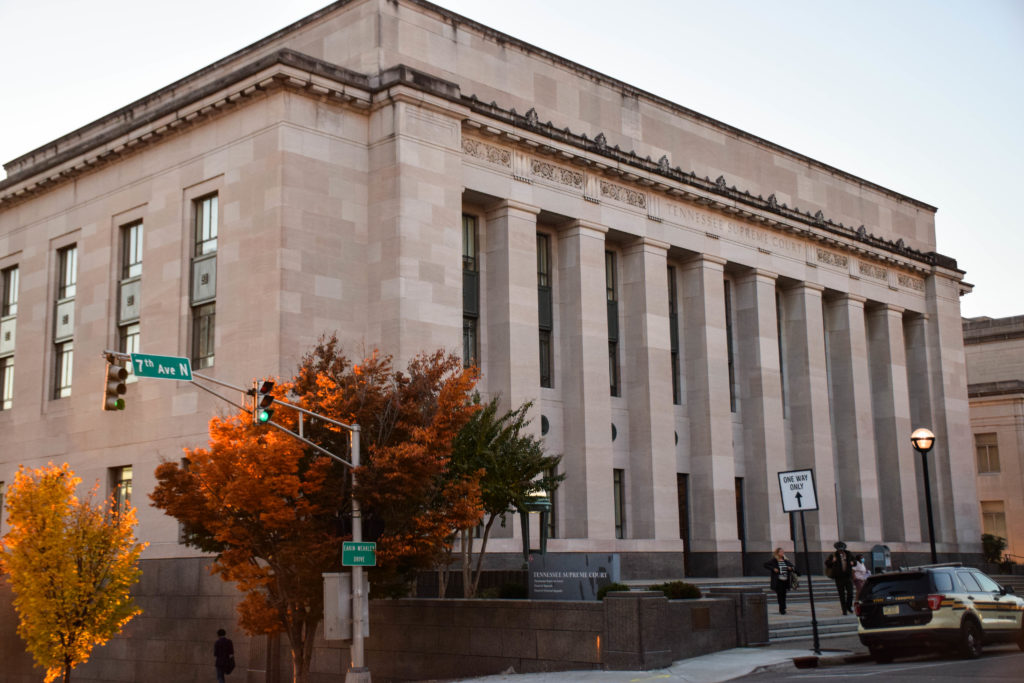
The Tennessee Supreme Court is getting a new justice, following the death of Justice Cornelia Clark last September.
Gov. Bill Lee’s pick for the open seat would shift the makeup of the bench, which now has just one Democratic appointee. Clark and Justice Sharon Lee were both appointed by Democratic Gov. Phil Bredesen.
Now, Lee plans to fill Clark’s post with Sarah K. Campbell, who currently serves as Tennessee’s associate solicitor general and special assistant to the attorney general. Earlier in her career, she clerked for U.S. Supreme Court Justice Samuel Alito and Judge William Pryor, who are both known for their conservative interpretations of the law.
“Sarah is a highly accomplished attorney and brings valuable experience from the federal level, including the U.S. Supreme Court,” Lee said in a press release. “Her commitment to an originalist interpretation of the state and federal constitutions will serve Tennesseans well.”
Campbell is a member of the Federalist Society, which describes itself as “a group of conservatives and libertarians interested in the current state of the legal order” on its website. The organization has become a breeding ground for some of the country’s most prominent conservative legal minds, including multiple members of the U.S. Supreme Court, Texas Sen. Ted Cruz and Kenneth Starr, who served as the independent counsel in former President Bill Clinton’s impeachment investigation.
In a November Federalist Society podcast episode, Campbell said she was optimistic that a pending U.S. Supreme Court case would restrict access to abortion in Mississippi after 15 weeks. She noted that Tennessee and several other states have passed similar legislation in recent years.
“The activity of state legislatures in this area is such strong evidence that the viability line is not working,” Campbell said, in reference to the idea of limiting abortion access after a fetus becomes “viable” — a standard she said was “completely made up” later in the episode.
“We are really hoping for a decision that, if it doesn’t overrule Roe and Casey, that does rework the viability standard in a way that gives states the flexibility they need to respond to changes on the ground,” she said.
In her current role, Campbell spends the majority of her time defending the constitutionality of state laws when they are challenged in court, according to her Supreme Court application.
She cited several prominent cases in her application, including challenges to Tennessee abortion laws and to the state’s protocols for verifying signatures on mail-in ballots. Campbell also noted her work on a lawsuit brought by Tennessee and 19 other states against the U.S. Department of Education, which argues that federal guidelines to prevent discrimination based on gender or sexual orientation in schools is “overreach.”
Campbell’s appointment comes just weeks before the Tennessee Supreme Court is expected to hear two high-profile cases on the same day.
On Feb. 24, justices will re-consider a lawsuit brought by Davidson and Shelby counties to challenge the state’s Education Savings Account Pilot Program, which provides vouchers to parents who want to send their kids to private school. They will also hear new arguments in the case of Tyshon Booker, who says the state’s mandatory minimum sentence for first-degree murder violates the constitutional rights of juveniles who are sentenced to life with the possibility of parole.
The high court heard arguments in both cases while Justice Clark was still on the bench. Next month, they will evaluate the evidence once again with their new makeup.
But, before that can happen, the General Assembly must approve Campbell’s appointment.

